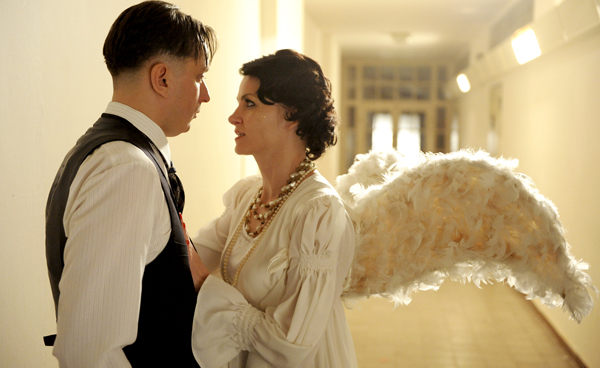|
Reviews of Recent Independent, Foreign, & Documentary Films in Theaters and DVD/Home Video

PROTEKTOR As World War II is such a rich ore to mine, there’s no end to films dramatizing how people resisted, or actively collaborated with, the Nazis. Director Marek Najbrt’s smart, handsomely mounted Protektor explores how the former Czechoslovakia dealt with the 1938 German annexation and invasion that preceded a world plunged into war. Emil (Marek Daniel, a perfect everyman) is a well-known Prague radio reporter married to up-and-coming movie actress Hana (a subtle Jana Plodkova), who initially doesn’t even blink when the Nazis take over. Nothing changes for her while she keeps working in front of the cameras. Since she’s Jewish, however, she loses her star status when the government implements employment restrictions. Further, she can only socialize in the Jewish area of the city and must adhere to the new curfew. Now reduced to a nobody without a career, she takes to sneaking into her neighborhood movie theater to avoid being constantly shut up inside their apartment. It is through Emil’s increasingly desperate attempts to save face with the Germans that she is left alone as more stringent (and murderous) anti-Semitic policies are implemented. In English, at least, there are multiple meanings to the film’s title, as Protektor (which refers to Emil as well as the Nazi Deputy Protector Reinhard Heydrich) can also be read as “Protect Her.” Najbrt conveys a part of his country’s cultural history by showing how the Nazis censored, used, or even rejected film and radio celebrities for propaganda purposes. As a result, the couple’s careers move in opposite directions. Hana’s slumps, and Emil’s star rises as he becomes a mouthpiece for the Reich. Even Germans immediately recognize him by his velvety voice. Throughout, Najbrt turns to a stylized visual refrain of Hana onscreen bicycling as if on a sound stage, with headlines spelling out the Nazis’ worsening war against Jews. In fact, the film opens with Hitler’s own belittling description of a Czech as “a cyclist who hunches over as he pedals” before Emil is seen frantically pedaling towards the camera. While effective at first, this bicycle metaphor is overdone and ends up getting a flat tire. The director more firmly explores the corrupting use of power. While Emil’s initially willing to recite the censored script given to him, he refuses to heed his supervisor’s recommendation that he divorce Jana, whose willfulness isn’t making things any easier on their increasingly stressful marriage. Yet his conscience doesn’t allow him to become a full-fledged collaborator, but only to do enough to keep himself and Hana safe, a stance that becomes less secure as the war progresses. Although there’s much familiar here, Najbrt outstandingly shows the divergent ways Prague, one of Eastern Europe’s cultural capitals, dealt with being overrun by Hitler. Miroslav Holman’s muted photography and Ondrej Nekvasil’s understated production design recreate a world in which danger gradually moves from the public sphere of radio and film studios to private homes, where one hangs a portrait of Hitler to try and convince the Nazis of one’s loyalty. The
tragic tale climaxes with an ingenious closing image, as the latest
rounded-up Jews slowly disappear from view before the final fade out:
it’s the Nazi ideal made literal. Although it’s almost too superficially
brilliant, the image lingers in the mind, giving this strongly detailed
drama a potent and bitter aftertaste.
Kevin Filipski
|

